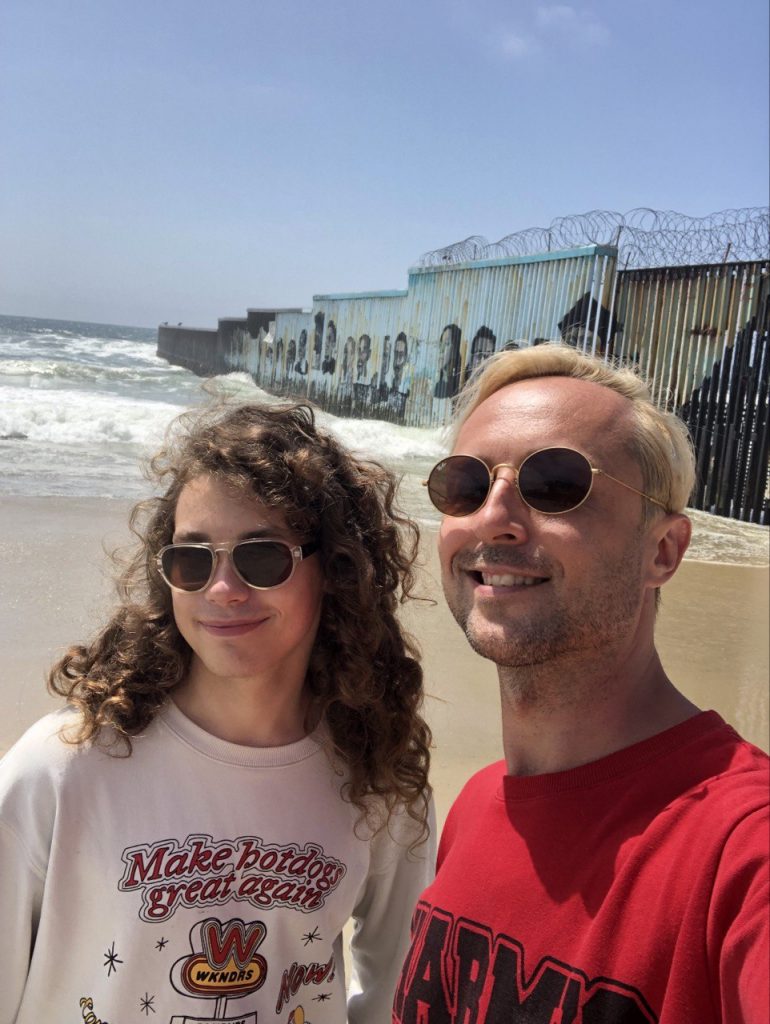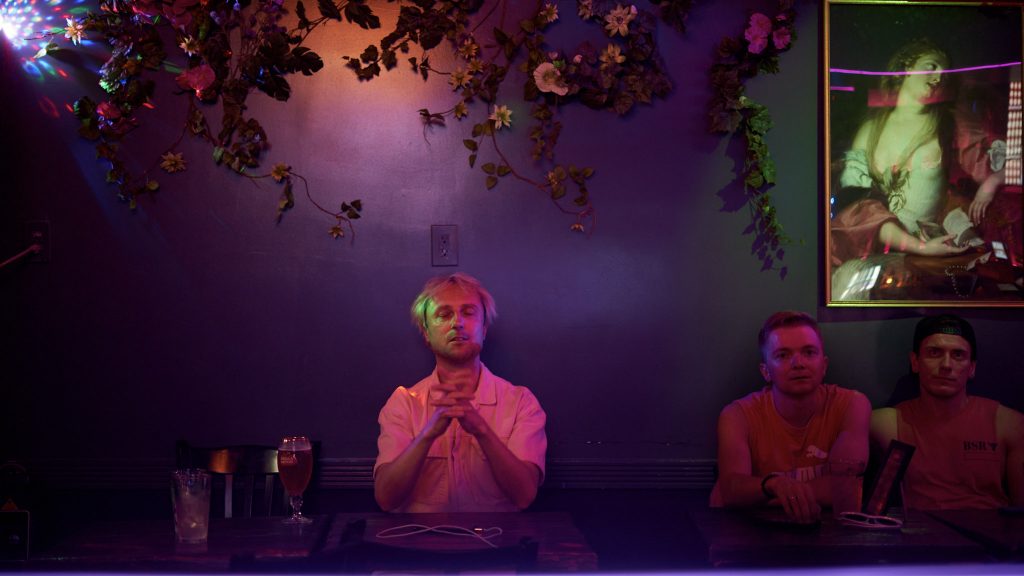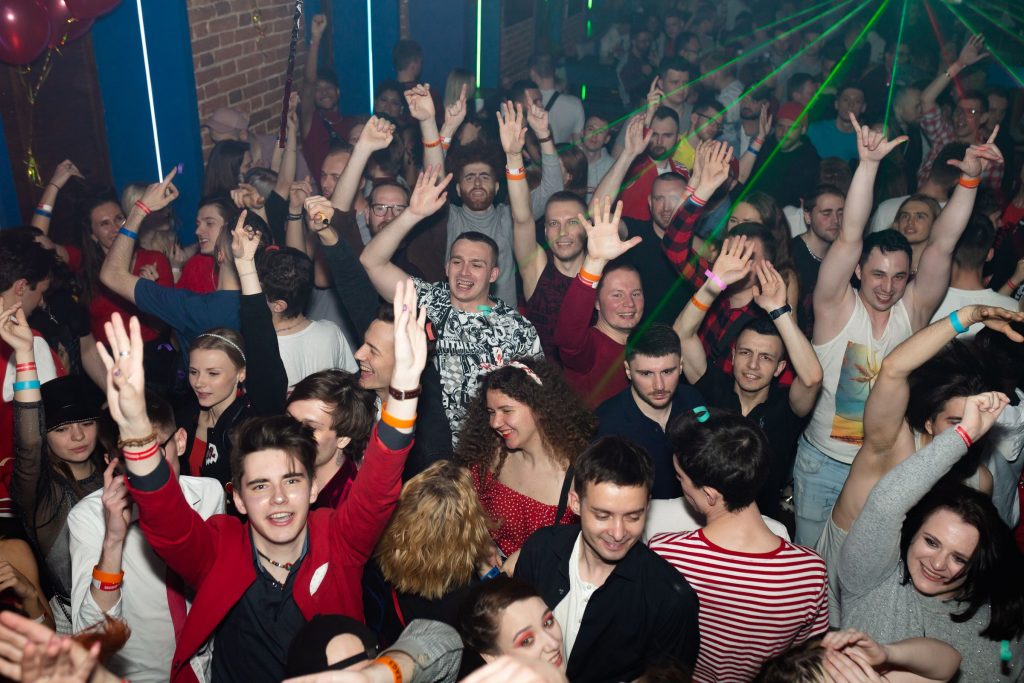Miloslav Chemodanov had set his sights on seeing a snowy owl.
It was a biting late January day to go to the beach in Queens, the kind where the sun dimly burned just above the horizon. Nevertheless, Chemodanov, 44, his boyfriend and their mutual friend had made the two-hour long train and bus ride to Rockaway Beach from the couple’s shared room in an eight-bedroom Crown Heights apartment packed with other immigrants. The trio had heard a snowy owl would sometimes perch on the dunes overlooking the Atlantic Ocean this time of year.
Chemodanov, a longtime Moscow resident and high-profile nightlife personality, had not yet had the chance to meet the Arctic bird, even in Russia where, nearly a year before, Chemodanov and his boyfriend Arkadii Sazonov fled their spacious three-bedroom apartment in the landlocked capital city.
“It was the war,” Chemodanov said of his ultimate decision to leave. Growing more afraid of the Kremlin’s seemingly unfettered aggression against perceived foes, the couple made their final decision in the wee hours of Feb. 24, 2022, the morning that Russia invaded Ukraine.
“It was the last drop,” Chemodanov said, “and it was like, ‘if they do this, they will do anything.’”
Chemodanov and Sazonov are just two of hundreds of LGBTQ+ Russians who have sought escape from Russia since the invasion began, according to Rainbow Railroad, a nonprofit that helps LGBTQ+ people from around the world escape persecution. By the end of 2022, requests for help from Russians had increased by 238% over 2021, with 378 total contacts, according to the nonprofit’s annual report. It says Russians now rank third, behind Afghans and Ugandans, in asking for Rainbow Railroad’s assistance.
“Requests from LGBTQI+ Russians highlighted their struggle to seek refuge from being forced to participate in a war that many did not want and a country that rejected who they were as people,” the report reads.
Chemodanov had the resources to flee the country without organizational assistance. Perhaps more fortuitously, he also had connections and downright luck to find a New York City apartment, especially compared with other Russian nationals seeking asylum in the city — many of whom are living in homeless shelters, according to Maxim Ibadov, a national coordinator at RUSA LGBTQ+, a Brooklyn-based network that supports queer asylum seekers from Russia.
Also Read: Citizens, Nonprofits Can Sponsor People Through Uniting for Ukraine Program
“Some immigrants that move from Russia have money,” Ibadov said. “But a lot of these folks, especially the queer ones who have already been economically disadvantaged in Russia, whatever money they leave the country with, they usually spend it on the move.”
Until 2022, Chemodanov had lived a fairly comfortable life. He had spent the better part of a decade working as a journalist, traveling across Europe and spinning as a DJ in Cyprus, Italy and Spain, as well as hosting his mainstay LGBTQ+ nightlife event, “Cherti,” — meaning “devils” in his native Russian — in Moscow. At one point, Cherti was regarded as one of the largest and well-known LGBTQ+ dance parties in Russia, drawing in hundreds of partygoers every night.

But in June 2013, Russian President Vladimir Putin signed off on legislation criminalizing the promotion of LGBTQ+ identities to minors, which could apply to everything from activism to non-heterosexual public displays of affection — even at adult-only club events like Cherti.
Also Read: LGBT in NYC and Where to Get Healthcare, Name Change Services and More
Chemodanov was forced to find another venue to host his parties, which came in the form of a smaller club helmed by a gay owner. Cherti went underground, serving as a word-of-mouth covert refuge for queer Russians to escape watchful patrols that were known to raid LGBTQ+ spaces. Desperate to keep Cherti alive, the club paid for private security guards, and Chemodanov stopped promoting Cherti on social media to avoid catching the attention of Russian authorities.
But partying in secret simply wasn’t enough, he said, noting that, in 2022, he faced potential criminal charges under the recently-expanded propaganda laws for promoting LGBTQ+ identities through Cherti and his anti-Putin podcast, “Gay Propaganda,” where he discusses “things I wish I had known growing up as a gay kid in Russia.”
As luck would have it
Like many other Russians fleeing the war, Chemodanov and Sazonov flew to Tbilisi, Georgia, one of the few former Soviet countries that wouldn’t require a visa. But the couple was met with less-than-friendly greetings in Tbilisi, where disgruntled Georgians protested the influx of new residents and resulting spike in rent prices. Signs that read “Russians Go Home” are not uncommon in apartment windows in Tbilisi. While there are limited protections for LGBTQ+ individuals, there’s been a constitutional ban on same-sex marriages in Georgia since 2018. It quickly became clear that Tbilisi was a stopping point in the couple’s journey, not their final destination.
“I dig through tons of English material every day, trying to find a loophole, some way to get off to Canada or the States or something and not starve to death in the process,” Chemodanov later wrote in a Telegram post to his followers in Russian. “The deadline is tight, the pressure is huge, the answer has not yet been found. All this is superimposed on a daily emotional attack — torture by news from Ukraine.”
Chemodanov had been to the U.S. several times before the invasion, albeit under more inviting circumstances. As a DJ, he had played at some of Brooklyn’s largest LGBTQ+ nightlife venues like 3 Dollar Bill, a gay club in Bushwick, during the club’s first-ever Russian LGBTQ+ pride event, he said.
In Russia, he would save up for months to visit New York twice a year, where he felt “the best of my life.”
“In New York, I can get a taxi — or an Uber, if it’s not too expensive — in a little dress and go to some club, and no one gives a shit about that,” he said. “I can walk in a skirt or rainbow flag; I can hold my boyfriend’s hand and hug him and nobody will say anything.”
But getting into the U.S. this time around would be much more difficult given Chemodanov’s lack of a visa, he said. After weeks of research, the couple watched YouTube videos in Georgia learning how to cross the border into the U.S. from Mexico, a dangerous and sometimes deadly endeavor.
The Mexican border in Tijuana was seemingly abundant with opportunities to get to the U.S., Chemodanov recalled. Mexican patrolling officers would toothily accept money in exchange for looking the other way, Chemodanov said, adding that he watched his fellow asylum seekers robbed blind by false promises only to end back at square one.

Chemodanov was eventually able to cross the border by car.
“It’s just a question of surviving”
The choice to settle in New York City was a no-brainer for Chemodanov, who already had friends in the area and was familiar with Brooklyn’s LGBTQ+ nightlife scene. The American car filled with his American friends drove from the border at Mexicali to Los Angeles, where the couple stayed for a week to plan their next move: a flight to the Big Apple.
Also Read: LGBTQ+ Asylum Seekers Allege Discrimination in Shelters
After crashing with several friends for two months around New York City, Chemodanov found a reasonably-priced room in Crown Heights, which he can afford only with Sazonov after the pair work a handful of under-the-table jobs and with the help of a guarantor signature of friends with a credit score. And in another stroke of luck, an immigration attorney offered to represent the couple pro bono after she found them on social media.

Chemodanov and Sazonov are not eligible for work permits until six months after their asylum claims are filed. The couple hopes to begin working legally this summer, but it can sometimes take months for permit papers to be processed after recipients become eligible.
Still, Chemodanov said he’s fortunate to be able to live paycheck-to-paycheck and “not starve” while escaping the Putin regime. But he worries he won’t gain asylum in the U.S. One in 10 asylum cases for Russian nationals was denied from July 2022 to Jan. 2023, according to the most recent statistics from U.S. Department of Justice records. Any possibility of being sent back to Russia is unfathomable to Chemodanov.
“If I get sent back to Russia, if I am not in prison, I will leave the country as soon as I can,” he said. “It’s just a question of surviving.”
Chemodanov often dreams of DJing in his sleep. From his shared bed with Sazonov in Crown Heights, he’s conjuring up vibrant scenes where he’s spinning sets to audiences across the world again. But in real life, he doesn’t expect it to happen, he said, citing the competitive nature of the New York DJ scene. He also doesn’t believe he can pursue journalism in the U.S. given that English is his second language.

For his third career, Chemodanov aims to work with special needs children once he is able to get legal working papers. It’s a passion he’s harbored ever since he worked at a summer camp for children in Russia in his twenties, he said.
“You don’t have to have only one career in your life,” he said. “If I’m already starting from scratch, why not try something new?”
Until then, Chemodanov said he’ll spend his time in between jobs writing a memoir of his journey to the U.S. and wandering through New York’s cinemas and museums with his boyfriend. The couple also hopes to explore more of the city, including trips to the beach.
Chemodanov reported that a snowy owl never came to them on the bitterly cold day in January in Rockaway Beach, even as they patiently waited by the dunes for what felt like hours.
“We still had a great time,” Chemodanov later wrote on Telegram. “The day was warm, the ocean was beautiful, the beach was empty [and] we had a wonderful walk and breathed in the sea air.
“In general, living in a city by the ocean is great! Even in winter!”





